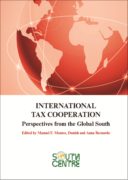Ecuador
Reflexiones sobre la Judicialización de la Salud en America Latina
Cuales son las causas de la problemática de la judicialización de la salud? Que efectos provoca sobre el sistema? Se discutira esta temática a partir del análisis de jurisprudencia y regulación en Argentina, Colombia y Ecuador.
Fecha: 23 Junio 2020
Hora: 7 pm Suiza, 2 pm Argentina, 12 pm Columbia/Ecuador
(more…)
International Tax Cooperation: Perspectives from the Global South
 About the Book:
About the Book:
A substantive reform of the global tax system involving a variety of multilateral platforms is underway. The question is not whether the tax standards and practices will change, but in which direction.
Developing countries have long sought changes in rules, standards and procedures shaping the allocation of taxing rights among sovereign states. In the wake of the 2008-2010 Great Recession, developed country governments engaged in massive public sector layoffs and channeling enormous public resources to bail out large financial companies and their wealthy investors. The Panama Papers, the Paradise Papers, the Lux Leaks became household words in the United States and Europe because of the journalistic coverage. Other scandals, such as the “cum/ex” fraud in Germany involving a loophole in the taxing of dividend receipts were less known but just as materially significant. Tax reform, particularly as it applied to the treatment of corporations working in multiple tax jurisdictions, thus became not only a problem of developing countries but an issue of global concern.
(more…)
Tax Haven Listing in Multiple Hues: Blind, Winking or Conniving?
By Jahanzeb Akhtar and Verónica Grondona
Tax havens are among the biggest challenges faced by developing countries in achieving their national development goals. States, international organisations, multilateral agencies and non-governmental organisations have all made several efforts at compiling ‘lists’ of tax havens at the multilateral and national levels, with varying levels of seriousness and outcomes. This research paper examines these efforts by analysing the objectivity of criteria used and the clarity of the final outcome in a comparative manner. The paper is organized into four sections dealing with the tax haven blacklisting by the Organisation for Economic Co-operation and Development (OECD), the countries of the South, the European Union (EU) and an analysis across lists. The concluding section offers some suggestions.
(more…)













 About the Book:
About the Book: